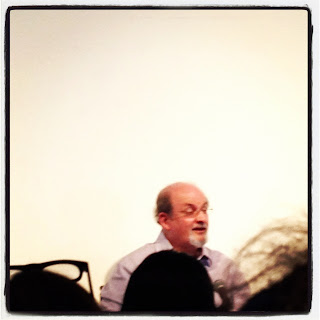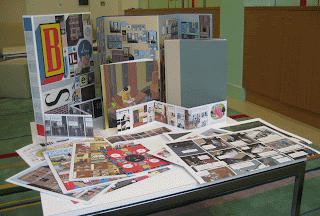 |
| ["Danza Folklorica"- Frederico Fuentes] |
I’m a realistic person to a fault, at times. As a
child cartoons irritated me because animals don’t in fact talk and
children do age over time (those damn effing babies on the
Rugrats). As an adult my realistic tendencies have been a
blessing and a curse. My savings account has a decent cushion in it
because I have a realistic perception of the economy and life’s
abilities to throw financial curve balls. I try to set realistic
plans in terms of the students I teach and what I expect of others. My
tendency for realism calls for contingency plans and Plan Bs (and Cs and
Ds). I am a prepared woman. Unfortunately, realism tends to prevent
optimism and often leads to irrationality (my
poor husband), but that’s another post for another day.
Given my inclination for what is real, it’s a
wonder that I’ve developed such a love for magical realism. For those of
you who haven’t been in my English class this week or who need to brush
up on your literary terms, magical realism refers
to a realistic story that is interspersed with occasional magical
elements that are generally accepted by the characters as being normal
(using the term to define the term- tsk tsk). Magical realism is a genre
that requires readers to merge, and acknowledge,
the two realities within a text, temporarily suspending belief. I’ll
spare you the rest of the lecture and the quotes from all the professors
I forced upon my students, but if you’re interested I do have a
PowerPoint and the clip from
Pushing Daisies that we watched today… Anyway, magical realism
allows anything from simple mind reading to telekinesis to paranormal
activity to occur in an otherwise “normal” story.
I’ll admit, for loving the genre so much I haven’t read nearly enough of its books. Right now we’re reading
Chronicle of a Death Foretold by Gabriel Garcia Marquez in class, but I’ve also read his most famous novel,
One Hundred Years of Solitude. Isabel Allende’s House of the Spirits
was the first magical realism novel I read, back in high school, and
since then I’ve read a few more of Allende’s works. Toni Morrison’s
books incorporate magical realism, as
does Salman Rushdie’s Midnight’s Children. I’m also a huge fan
of Carlos Ruiz Zafon, who I am going to see read in a few weeks. While
this is definitely not a comprehensive sampling, it has been enough to
make me realize how much I enjoy reading these
books.
I think my appreciation comes from the fact that in
order to pull off magical realism an author has to be quite talented.
Enough layers and details have to be established in the realistic
portion of the text to support the magical elements,
a surely difficult task. An author has to create a careful balance that
ensures the right amount of whimsy without crossing the line into
cheesiness. While not a book, the perfect example of this is the
“so-good-it’s-bad” Sarah Michelle Gellar movie
Simply Irresistible, where she takes cooking advice from a
magical talking crab. A good writer makes their audience recognize and
accept the magical elements of the story, allowing them to seamlessly merge into
the ones that are realistic.
Back to the term whimsy. Not counting Harry Potter,
I don’t generally care for the fantasy genre, or novels that center
around magic, but there is something about the whimsical that attracts
me. To me whimsical is the movie
Amelie, it’s the tree that grows inside Skylight bookstore, it’s
little kids dressed up running around their backyards with homemade
capes and puppets (for the five kids left in the world that aren’t glued
to an imagination-robbing device for hours a day). It’s a feeling that gives you the notion
of unusual possibilities existing in this world that can often seem mundane and cynical.
Magical realism may not always be pretty or positive, but it opens tiny little trap
doors that allow you to escape from the ordinary.
And then the door closes and you’re back to reality- and so on and so
forth.
Professor Luis Leal does describes the genre best when he says, "If you can explain it, then it's not magical realism."















